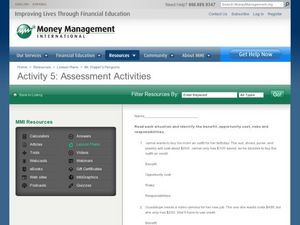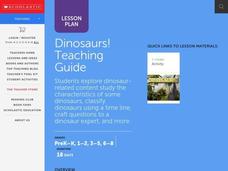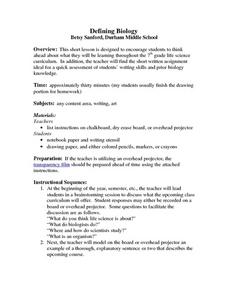Curated OER
Air Quality and Transportation
Second graders observe car pooling patterns and the important role car pools play in reducing air pollution. They explain how they get to school and graph the types of transportation that is used. Students make a list of the different...
Curated OER
Create and Locate Your Own Business
High schoolers simulate the creation of their own business. Using the internet and database exploration, they research community profiles and select a business. Pupils define the target market and investigate a business location. ...
Curated OER
Healthy Colon with Good Digestion and Fiber
Sixth graders learn about the colon and what it does. In this lesson about digestion and the colon, 6th graders analyze what this organ's job is. Students complete four activities where they explore the importance of fiber, the makeup of...
Curated OER
Pioneering Children on the Move
Students inquire about life for pioneer children. In this pioneer period lesson, students analyze photographs of children, make information foldables, and create a covered wagon that was typical of the ones of the past. Students will...
Curated OER
Money situations
In this money situations worksheet, high schoolers read money word problems and then list the benefit, opportunity cost, risks, and responsibilities for each one. Students do this for 6 questions.
Curated OER
School Newspaper
Students investigate writing a school newspaper. In this writing a school newspaper lesson, students choose topics that will be included in the school newspaper. Students view online sites about writing articles and break into groups to...
Curated OER
Animal Slideshow
Second graders view animal fact sheets, and make a slide about an animal. In this animal classification lesson plan, 2nd graders list facts that help classify the animal. Students use Microsoft paint and color their animal....
Curated OER
Timely Technologies
Second graders explain how society influences the type of technology developed. In this science lesson, 2nd graders research about a topic they chose from the given list. They develop a creative presentation about it such as a play,...
Curated OER
Recycling
Students explore the recycling process. In this recycling lesson plan, students gain understanding of how garbage is disposed of. Students makes lists of things that can be recycled. Students discuss how animals and plants are damaged by...
Curated OER
Predator vs. Prey
Fifth graders participate in a game to become familiar with predators and preys. For this predator vs. prey lesson, 5th graders ascertain whether a photo shows an organism as a predator or a prey. Students read Killer Creatures....
Curated OER
Butterfly Life Cycle
Second graders explore biology. In this life cycle lesson, 2nd graders act out the stages a caterpillar goes through to become a butterfly. They spend days prior to this lesson observing caterpillars they have collected and developing...
Curated OER
How Do I know That a Book Is Just Right for Me to Read?
Students choose a book for reading. For this language arts lesson, students take steps to evaluate a book for free reading. Students make a list of words found in the book that they are unfamiliar with.
Curated OER
Gaia: The Wisdom of the Earth
Learners are introduced to Gaia theory of natural homeostasis. They graph Earth's temperatures over time, construct terrariums or monitor the outdoor environment. Related videos titles are suggested, but may be outdated. The objectives...
Curated OER
It's All Greek to Me!
While the ideas for Ancient Greek research are solid, there is little detail to help make your job easier. The focus here is familiarizing your class with online databases and print resources in their school library. After direct...
Curated OER
Science Puzzlers, Twisters, and Teasers: The History of Life on Earth
A somewhat amusing assignment, this worksheet lists statements that an ancient organism may have made and asks learners to determine what geologic era that each may have lived in. It uses witty word puzzles and fill-in-the-blank-style...
Curated OER
Students as Consumers: The Relationships Between Communities
Learners survey the clothing they are wearing to determine where it was made. They work in groups to locate the countries where the clothing was manufactured, develop questions about what makes a good purchase and work with a buddy class...
Curated OER
KWL Chart: Living and Non Living
In this KWL chart worksheet, students fill in this graphic organizer about living and non-living things. Students complete 3 sections in the chart.
Curated OER
Picture Dictionary
Students create picture dictionaries to encourage the development of letter-sound recognition. In this alphabet project, students cut out pictures from magazines and glue them onto tagboard, and then write the name of the picture below...
Curated OER
Transitions
Transitions are the focus of a presentation that includes information about the importance of transitions and types of transitions. Included is a list of commonly used transition words.
Curated OER
Dinosaurs
Students will develop goals for inquiry. They will also improve content area reading and research skills. The context of studying dinosaurs will help learners to distinguish from organisms that live presently and those from the past...
Curated OER
Science: Grade 4
Building a scientific vocabulary is important for all students and this presentation provides a list of words typical to 4th grade science curriculum. Tip: Adding images to this resource will make the vocabulary more accessible to ELLs...
Curated OER
Defining Biology
Sixth graders engage in a brainstorming activity in which they predict what the next grade level or subject matter curriculum offer. They write and draw a picture about their predictions.
Curated OER
Factor Race
Students practice finding factors for numbers. In this factor lesson plan, students draw a card and list all the factors for that number. Each person scores points depending on the number of factors they have written correctly.
Curated OER
Investigating Voluntarism in the Nonprofit Sector
Students research a nonprofit organization of their choice. They interview a member of the organization and present to the class their findings. They list the job opportunities found there and volunteer for the organization.























